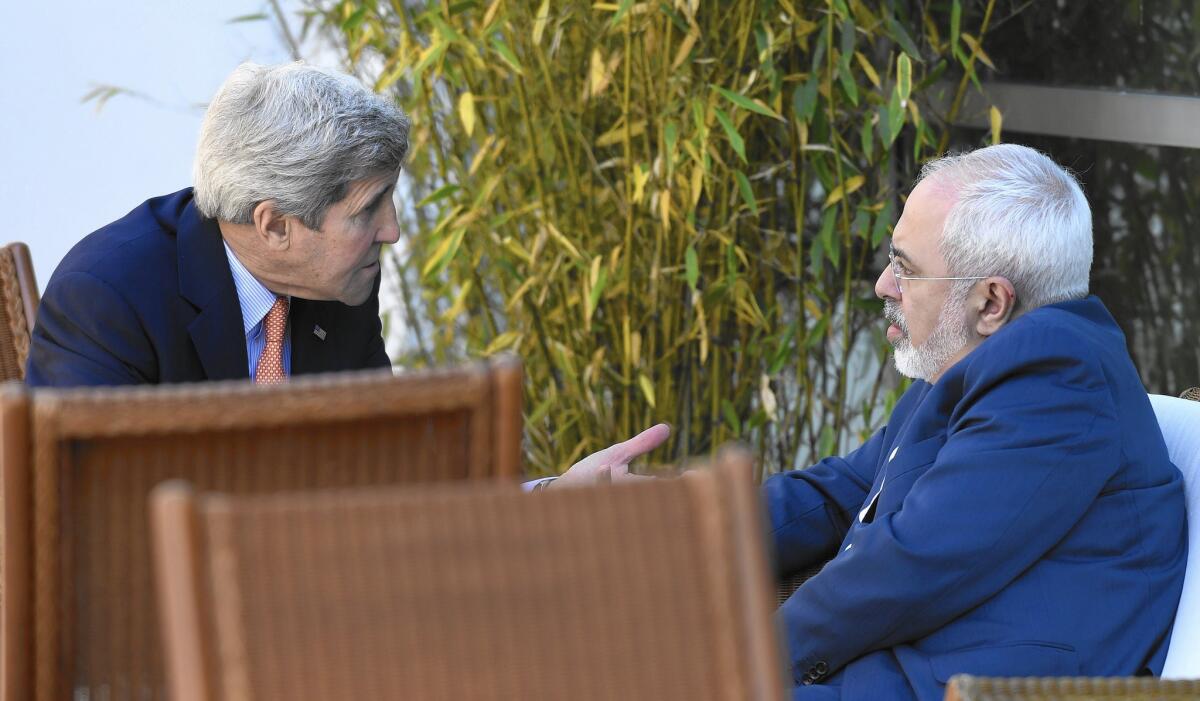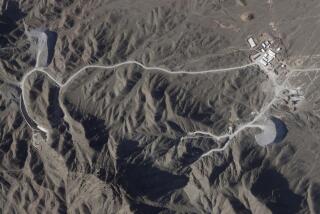In Iran nuclear talks, discord on inspecting undeclared facilities

- Share via
reporting from WASHINGTON — Over the last 20 months, world powers seeking a nuclear deal with Iran have worked out tentative agreements to monitor and secure the country’s known nuclear facilities to prevent it from building a bomb.
But as negotiations near a June 30 deadline, diplomats are still at odds over a tougher issue: how to keep tabs on military bases and other sites where the Iranians might secretly work on a weapon.
The six-nation diplomatic bloc negotiating with Iran wants United Nations nuclear inspectors to be able to poke around so-called undeclared facilities if they suspect nuclear work is going on. Such “challenge inspections” raise sensitive issues of national sovereignty and pride that set off years-long struggles with Saddam Hussein’s Iraq, North Korea and Iran.
With Iran’s known enrichment facilities at Natanz and Fordow, as well as a heavy-water reactor at Arak, under international oversight, the country’s leaders would almost certainly look elsewhere to conduct any secret nuclear work, said Gary Samore, former nonproliferation advisor to President Obama.
“It’s the undeclared sites that are the real threat,” he said.
Many Western officials say a comprehensive deal with Iran is still likely even though talks may stretch past the current deadline. But they acknowledge that challenge inspections are among the issues that could still sink the talks.
Several months ago, U.S. officials thought they had agreement in principle on a compromise plan: The U.N.’s nuclear watchdog, the International Atomic Energy Agency, would have wide latitude to investigate undeclared sites, but Iran would be able to dispute those requests in an international forum.
But Iran’s negotiators backtracked after supreme leader Ayatollah Ali Khamenei began insisting he would never allow foreigners into Iranian military bases.
The five permanent members of the U.N. Security Council — the United States, Britain, France, Russia and China — plus Germany are negotiating with Iran for a deal that would ease tough international sanctions if Iran agrees to restrictions, including strict monitoring and inspections, aimed at preventing it from obtaining a nuclear weapon.
Iran denies any interest in building a bomb, but the major powers have reason to distrust it. After all, the uranium enrichment facilities at Natanz and Fordow were built and operated in secret until disclosed by outsiders.
In public, U.S. officials have said inspectors must be given “anywhere, anytime” access to sites where nuclear work is suspected. The administration will not accept a deal unless access is granted “to whatever Iranian sites are required to verify that Iran’s program is exclusively peaceful — period,” Deputy Secretary of State Antony Blinken said in a speech Monday.
In the negotiating rooms, however, U.S. diplomats aren’t demanding immediate access.
Rather, they’ve signaled that they’re willing to allow a panel some time to consider Iranian objections and weigh the evidence before allowing a challenge inspection to proceed.
The world powers have studied a proposal to have inspection requests judged by a commission, with voting representatives from the six powers, Iran and possibly the European Union.
Access would be granted if a majority of the eight supported an International Atomic Energy Agency, or IAEA, request for access. That means that Iran alone — or Iran backed by Russia and China — wouldn’t have the votes to stop an inspection if the United States and the other commission members favored it.
The proposal calls for a maximum of 30 days for deliberations by the commission on IAEA requests for inspections.
That could be enough time for Iran to conceal some recent nuclear activities if it wanted to, Samore said. But it wouldn’t be enough time to hide evidence of the uranium enrichment facilities Iran would need to create the fissile material required for a bomb.
If Iran refused to cooperate or was found to have cheated, sanctions could be quickly reimposed, or “snapped back,” as diplomats describe it.
That approach would provide “a strong mechanism” to ensure access, said a Western diplomat who declined to be identified in discussing the closed-door talks. “And that’s what we need.”
Some outside experts, including some who have urged a tough approach to Iran, agree.
“This would be very impressive,” said Samore, who heads a group called United Against Nuclear Iran.
It would be more intrusive than any U.N. inspections regime except those imposed on Iraq after the 1991 Persian Gulf War, when it was a conquered nation, Samore said. The inspectors ultimately dismantled Iraq’s chemical and biological weapons programs as well as an unexpectedly large nuclear development infrastructure, he said.
One risk to the plan is that the sanctions “snapback” might prove insufficient to compel Iran’s cooperation.
Although negotiators are debating how to shape the “snapback” provisions, the six world powers want to write them into the final nuclear agreement and include similar language in a new U.N. Security Council resolution. The resolution would formally implement the deal and give it international legitimacy.
Some experts worry that Russia and China, which have consistently resisted U.N. actions that would weaken their Security Council leverage, might balk at the last moment and refuse to vote for the resolution.
“For them to give up their veto is a big deal,” said Ilan Goldenberg, a former Obama administration official. “At the last moment, they might say, ‘That’s not what we agreed to.’”
Another possible obstacle is Iran’s recent warnings that it won’t allow U.N. inspectors access to military sites.
Western officials and private experts are divided on how seriously to take those threats. Many view them as bargaining tactics aimed at building pressure for concessions and predict Iran ultimately will back down rather than risk losing the deal.
Others believe Iranian negotiators have backtracked because of growing pressure from hard-liners at home who contend such intrusive inspections would violate Iran’s sovereignty and risk its security.
“The most positive interpretation is they’re just seeking negotiating leverage,” said Richard Nephew, a sanctions expert who was part of the U.S. team until earlier this year. “But if they start backing away from this key element, that becomes a real problem for the negotiations.”
More to Read
Sign up for Essential California
The most important California stories and recommendations in your inbox every morning.
You may occasionally receive promotional content from the Los Angeles Times.











